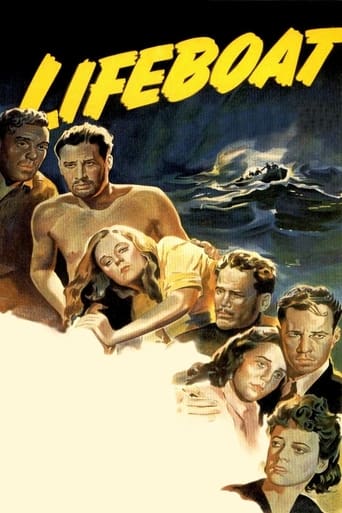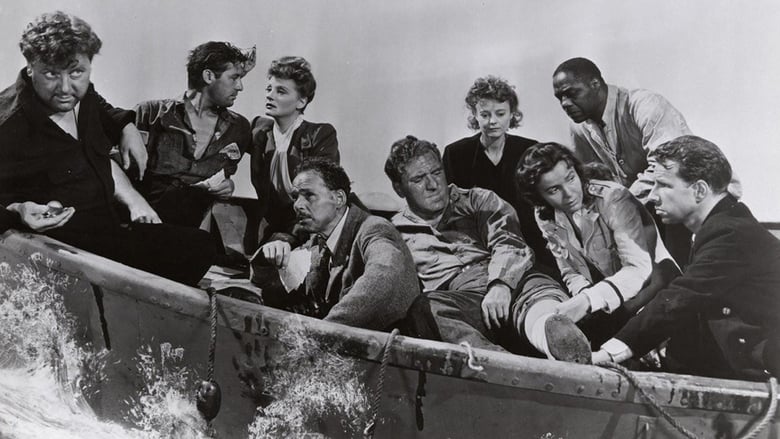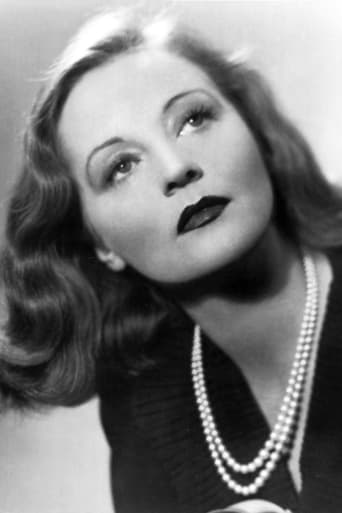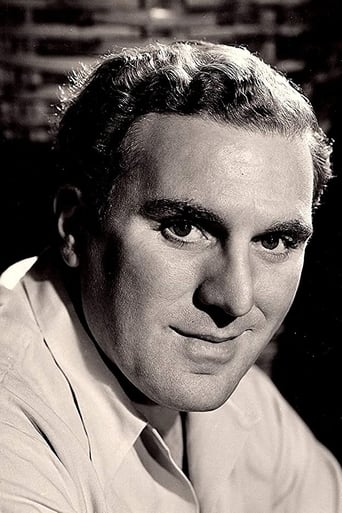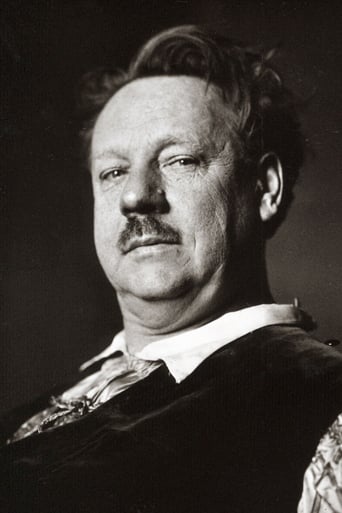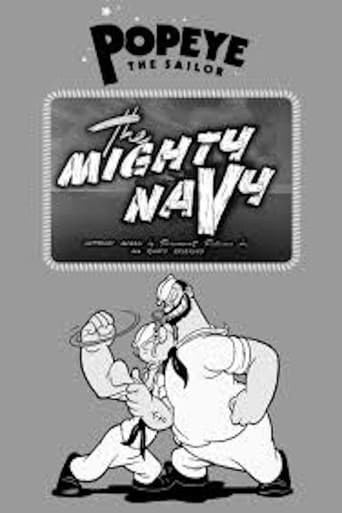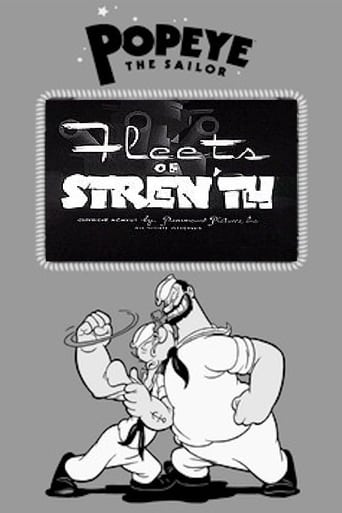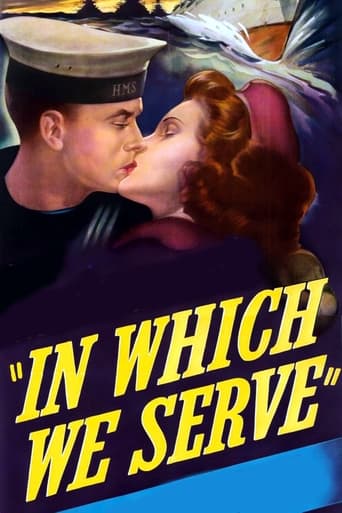Lifeboat (1944)
During World War II, a small group of survivors is stranded in a lifeboat together after the ship they were traveling on is destroyed by a German U-boat.
Watch Trailer
Cast


Similar titles
Reviews
While Hitchcock and his films seem to be endlessly referenced, Lifeboat is very seldom ever a part of those conversations. After seeing this film I'm still not sure why that is. Its unique setting, entirely aboard a lifeboat adrift at sea, is quite successful. The script is interesting and brisk, the acting good, and while some of the characters hint at stereotype, overall there is real suspense, wit, and humor represented here and its also quite entertaining. Worth checking out for Hitchcock fans and non-fans alike.
Alfred Hitchock's Lifeboat will almost immediately draw comparisons with Sidney Lumet's 12 Angry Men. Both almost exclusively take place in a singular location. Both focus on a group of characters confronted with moral dilemma and how their biases, experiences and emotions bubble under and take control of them. It is unusual then, for Hitchock's film to be the lesser one in the art of suspense. 12 Angry Men had a remarkable ability of building up tension within the space and through Lumet's manipulation of focal length, and then finally washing away the heat and stress with rain. Lifeboat floats more breezily along, because inherently there are large gaps that the plot demands to have, being lost at sea. The setting holds it back; it is not nearly an incisive a demonstration of space and composition as something like Rear Window, and because filming at sea was not viable, the characters seem to be half-removed from the background of the endless oceans. Sure, the frame and the boat is continually rocking, and they are pelted with water and wind during the storms, but because Hitchock lacks the ability to pull out (or even swivel around), the master shot is always locked in, and the boat seems to be rooted to the small spot of water, hardly moving at all.Still, the absence of the traditional score is a nice touch, in that the characters are left with only the soft, incessant lapping of the waves throughout to haunt them. So they can see as far as the eye can see, but it is only water, water and more water, so like the juror's room, the setting closes in claustrophobically, and gives rise to all sorts of conflict. The problem is simple: the American and British are asked to share a lifeboat with a German sailor, only moments are both vessels have been sunk. Opinions immediately start flying about; once a German always a German, the Nuremberg defense, the American vs the Christian way of thinking. Radioman Sparks thinks he should be subject to the proper authoritative procedures, whereas the Army nurse Alice can't understand why there must be so much killing in the world (baffling then, to end up in this line of work). The older, venerable characters are set up as the moral compasses; the good Christian Rittenhouse, and the worldly columnist Connie Porter. And so Hitchcock must inevitably engineer the downfall of their grace and goodwill.The characterisations are muddled because apart from the clear path set for these two, the other inhabitants of the boat mill about in the background and don't change much (including the literal milling about of the steward Joe, pushed to the metaphorical back of the boat and only called upon to utilise his 'natural' light fingers). The crewman Kovac is initially the most volatile of them all, even more villainous than the Nazi they have just pulled aboard, and takes charge of the boat's direction only because of his own ignorance and spite (even if he is right). Later, out of his compassion for his friend, he finally relents, but after that is content to simply sit back and watch the proceedings play out. There are little bursts of littler consequences; the anger of card cheating fizzles out almost immediately, and Connie loses her mind for a split second...only to be lying in the lap of Kovac the next. There is some drunken attempt at philosophising from Gus, but the most intriguing character must be the German, Willi. Walter Slezak has the sort of face you might trust, if it were not for the circumstances, and his jovial, ever-smiling outlook while rowing against the current almost allows the others to let their guard down. Willi has mastered the knack for pretending he isn't listening in on the English quarrels, so as Hitchock layers the profiles of his cast so that they are all facing the camera, there he is in the background, with a determined absent-mindedness about his expression, constantly swiveling and marvelling at the empty sky. It is a triumph in blocking for such a limited space, and Slezak dominates it. He sings merrily all day, not even a slight sign of tiring, and in the night cruelly goads a man to seek the depths of the ocean for relief ("Remember your name is Schidmt"). Critics were not happy about this, especially in the midst of the war. How could a Nazi be so resourceful, so sneaky, so clever? But Hitchock respects his villain, building him up as someone who could be an ally in a desperate time, and also making him despicable enough to warrant the fury that sends him overboard with a few solid whacks of the boot from the gentle industrialist Ritt. An inhuman act surely, but is it justified? Very tricky indeed. One last question: does the directorial tag of Hitchock ultimately hurt or better it?
Tallulah Bankhead made very few films and this one is probably the best known of her film performances. She played Constance Porter, a self-involved wealthy journalist, who was aboard a ship before a Nazi torpedoed it. She survived along with her luggage in the lifeboat by herself until other survivors come along. Bankhead had a history of difficulty and perhaps it is why she never made a film career. Bankhead was better known onstage in theatre. The cast includes other theatre veterans like Hume Cronyn, Canada Lee and more. Mary Anderson and Heather Angel are the only two female supporting roles overshadowed by Bankhead. A film veteran like Walter Slezak also performs. The cast and ensemble work together as a team though surviving in the lifeboat. The film could actually be adapted to a stage production if possible. The film is set in one lifeboat surrounded by water. The director Alfred Hitchcock did an admirable job with this film. Sadly, "Lifeboat" gets overshadowed by other Hitchcock gems. If you see his entire film catalog, you will "Lifeboat" as a gem and treasure not to be missed. It should have been nominated for Best Film as well too. I only wondered and worried about what happened at the end of the film. It leaves you hanging and wanting more.
A drama teacher once told me a personality functioning is much more interesting than an actor. We don't have personalities functioning so much anymore - the Bette Davises, the Katharine Hepburns -- but "Lifeboat" demonstrates the truth of that statement with one of the great personalities, Tallulah Bankhead.On film in the early '30s, Bankhead wasn't as effective as she is here, mainly because she played ordinary roles that anyone could have played. Here, the stunning actress plays a journalist, Constance Porter, as filtered through Tallulah -- in a mink, sitting on the boat with a typewriter, a camera, and wearing a Cartier bracelet, as she addressed everyone as "darling."Hitchcock's "Lifeboat" was a World War II film about a group of people stranded in a lifeboat after the Germans sink their ship. The stars, besides Bankhead, are John Hodiak, Hume Cronyn, William Bendix, Mary Anderson, Henry Hull, Canada Lee, and Walter Slezak as the Nazi who hitches a ride and nearly outsmarts them all - quite a statement during the war.It's a story of disparate people working together trying to survive through horrific weather conditions at times, injuries, hunger, and thirst, and then being virtually taken over by a Superman who sings in German and can row the boat, probably toward a German supply ship instead of Bermuda. "So we're all going to fold up and die," Constance says to the passengers when they have lost hope. "We not only let the Nazi do our rowing for us, but our thinking!"The acting is wonderful, from Hume Cronyn as a Cockney, Slezak as the cruel German, macho John Hodiak coming on to Constance, and beautiful Mary Anderson as a troubled young woman. Especially poignant was William Bendix's performance as Gus, a regular guy in love with a good-time girl named Rosie.A very exciting film, done in the days before special effects -- it's a tribute to Hitchcock's ingenuity.

